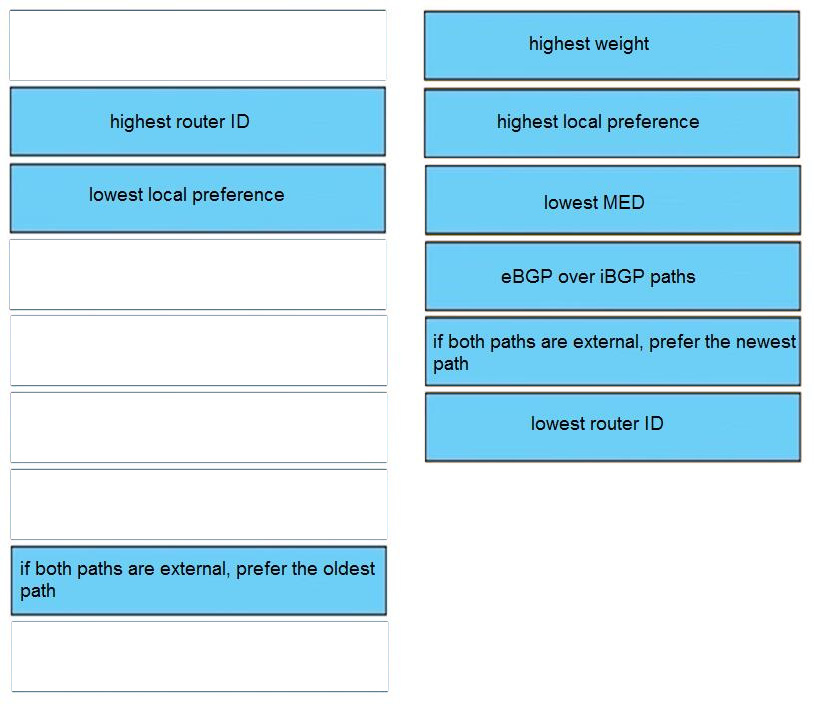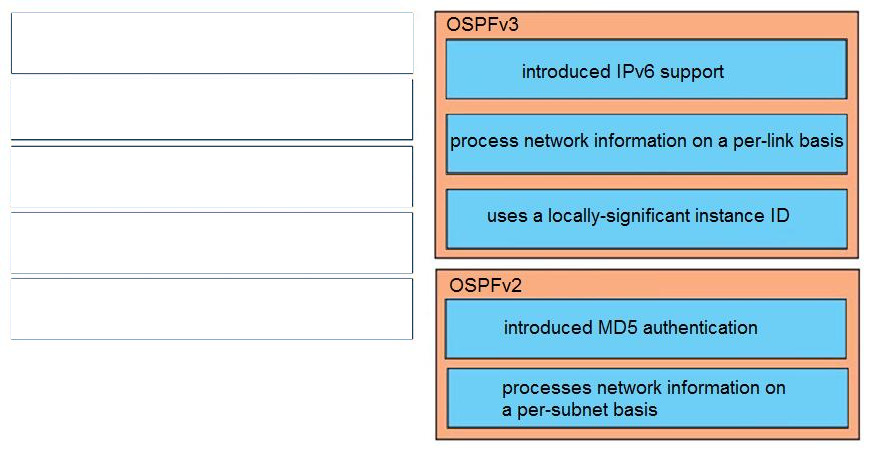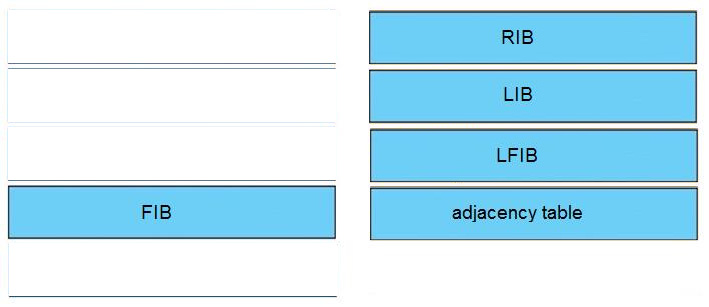Exam Details
Exam Code
:300-510Exam Name
:Implementing Cisco Service Provider Advanced Routing Solutions (SPRI)Certification
:CCNP Service ProviderVendor
:CiscoTotal Questions
:210 Q&AsLast Updated
:Mar 27, 2025
Cisco CCNP Service Provider 300-510 Questions & Answers
-
Question 11:
DRAG DROP
Drag and drop the attributes for the BGP route selection on the left into the correct order on the right. Not all options are used.
Select and Place:
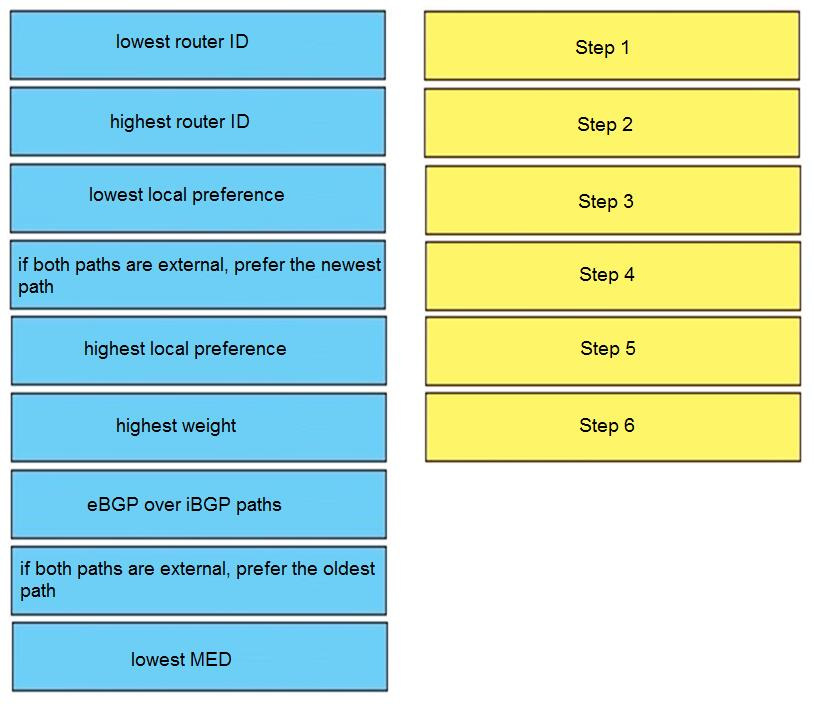
-
Question 12:
DRAG DROP
Compare different features between OSPFv2 and OSPFv3. Drag and drop the descriptions of OSPF from the left onto the correct OSPF versions on the right.
Select and Place:
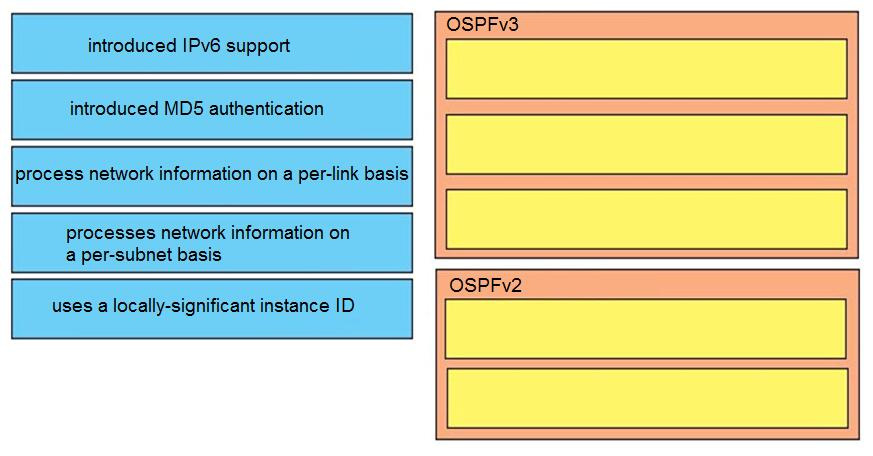
-
Question 13:
DRAG DROP
An engineer is troubleshooting end-to-end customer traffic across an MPLS VPN service provider network.
Which tasks should the engineer use to solve the routing issues?
Drag and drop the table types from the left onto the most useful troubleshooting tasks/router types on the right. (Not all options are used.)
Select and Place:
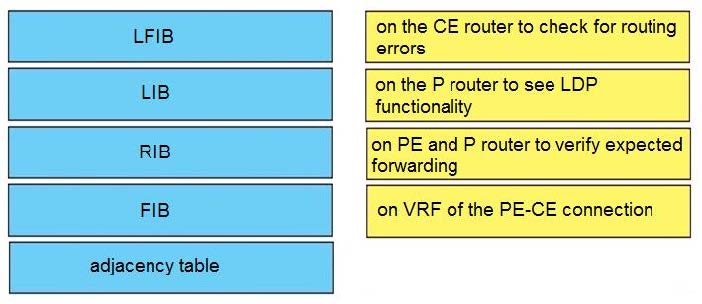
-
Question 14:
Which keyword is used with the match route-type command to redistribute the external BGP and IGP routes using route map?
A. match route-type type-1
B. match route-type nssa-external
C. match route-type type-2
D. match route-type external
-
Question 15:
Refer to the exhibit.

An engineer is troubleshooting IS-IS configuration between two areas. IS-IS Area-A network 30.1.1.0/24 is leaked into IS-IS Area-. R2 is failing to filter the route updates from network 10.1.1.0/24. Which configuration must the engineer apply to resolve the issue?
A. R2(config)# ip prefix-list List2 seq 5 deny 10.1.1.0/24 R2(config)# interface fastethernet 0/0 R2(config-if)# ip router isis 100 R2(config-if)# router isis 100 R2(config-router)# distribute-list gateway List2 in
B. R2(config)# ip prefix-list List1 seq 3 deny 10.1.1.0/24 R2(config)# ip prefix-list List1 seq 5 permit 30.1.1.0/24 ge 25 1e R2(config)# ip prefix-list List1 seq 10 permit 0.0.0.0/le 32 R2(config)# interface fastethernet 0/0 R2(config-if)# ip router isis 122 R2(config-if)# router isis 122 R2(config-router)# distribute-list prefix List1 in
C. R1(config)# ip prefix-list List2 seq 5 deny 10.1.1.0/24 R1(config)# interface fastethernet 0/0 R1(config-if)# ip router isis 100 R1(config-if)# router isis 100 R1(config-router)# distribute-list gateway List2 in R (config-if)# router isis 150 R1(config-router)# distribute-list route-map Map1 in
D. R2(config)# access-list 101 deny ip any 10.1.1.0 0.0.0.127 R2(config)# access-list 101 permit ip any 30.1.1.0 0.0.0.63 R2(config)# access-list 101 deny ip any 0.0.0.0 0.0.0.0 R2(config)# interface fastethernet 0/0 R2(config-if)# ip router isis 121 R2(config-if)# router isis 121 R2(config-router)# distribute-list 101 in
-
Question 16:
Refer to the exhibit.

.
R1 is expected to receive routes originating from AS 65516 and from any ASs that are directly attached to it. However, R1 is receiving routes only from AS 65516. Which action corrects the configuration?
A. Change the regular expression in the AS-path permit filter to .*.
B. Change the regular expression in the AS-path permit filter to ^65516_[0-9]*$.
C. Add the regular expression ^$. in the AS-path filter to permit the traffic from R2.
D. Change the regular expression in the AS-path permit filter to _65516_.
-
Question 17:
Refer to the exhibit.
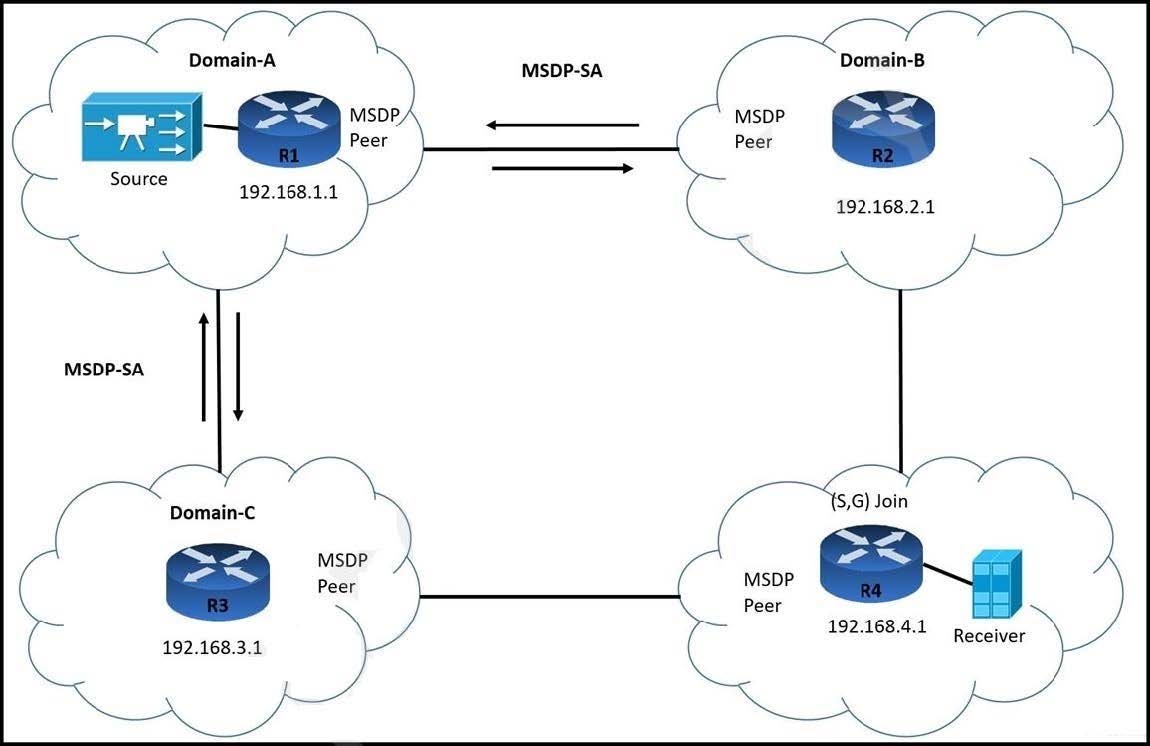
R3 is: failing to accept multicast RP information from Domain-A advertising MSDP SA messages to R1 and R4
receiving SA messages only from R4
Which command must the engineer implement to resolve the issue?
A. R3# ip msdp sa-filter in 192.168.3.1
B. R3# no ip msap sa-filter in 192.168.1.1
C. R3# no ip msdp peer 192.168.1.1
D. R3# ip msdp sa-filter out 192.168.1.1
-
Question 18:
Refer to the exhibit A. R1# ip msdp sa-filter in 192.168.3.1

Router R1 is configured to advertise outgoing SA messages to routers R2 and R3, but to receive incoming SA messages only from R2. Which additional configuration must an engineer apply to router R1 so it filters all MSDP SA messages from Domain-C?
B. R3# ip msdp sa-filter out 192.168.3.1
C. R3# ip msdp password peer 192.168.1.1
D. R1# ip msdp password peer 192.168.3.1
-
Question 19:
What is the difference between a source tree and a shared tree in a multicast environment?
A. To route traffic from source to receiver a source tree uses a link-state routing protocol and a shared tree uses a distance-vector routing protocol.
B. A source tree has its root at the source, and a shared tree has its root at a designated rendezvous point.
C. To stream multicast from source to receiver, a source tree uses PIM-SM and a shared tree uses PIM-DM.
D. Source trees are the default type for bidirectional PIM, and PIM-DM uses shared trees by default.
-
Question 20:
What is the difference between basic IS-IS and OSPF packet types?
A. IS-IS and OSPF use area packets, but only IS-IS uses sequence number packets.
B. IS-IS and OSPF use link-state update packets, but only OSPF uses link-state ACK packets.
C. IS-IS and OSPF use Hello packets, but only OSPF uses DBD packets.
D. IS-IS and OSPF use link-state update packets, but only IS-IS uses DBD packets.
Related Exams:
300-510
Implementing Cisco Service Provider Advanced Routing Solutions (SPRI)300-515
Implementing Cisco Service Provider VPN Services (SVPI)300-535
Automating and Programming Cisco Service Provider Solutions (SPAUTO)350-501
Implementing and Operating Cisco Service Provider Network Core Technologies (SPCOR)
Tips on How to Prepare for the Exams
Nowadays, the certification exams become more and more important and required by more and more enterprises when applying for a job. But how to prepare for the exam effectively? How to prepare for the exam in a short time with less efforts? How to get a ideal result and how to find the most reliable resources? Here on Vcedump.com, you will find all the answers. Vcedump.com provide not only Cisco exam questions, answers and explanations but also complete assistance on your exam preparation and certification application. If you are confused on your 300-510 exam preparations and Cisco certification application, do not hesitate to visit our Vcedump.com to find your solutions here.
